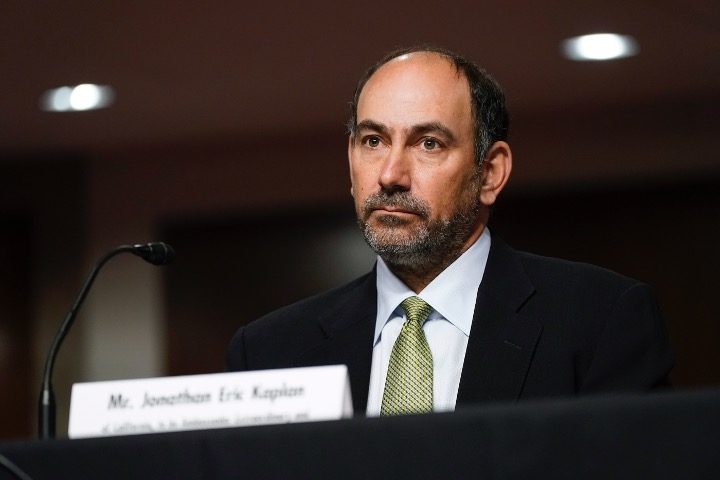
President Joe Biden’s ambassador to Singapore is “belittling and intimidating” embassy staff, spent thousands of dollars on unapproved items, and “missed some opportunities” to advance U.S. interests, according to a report from the State Department’s Office of Inspector General (OIG).
“The Ambassador did not hold himself to the highest standards of conduct, performance, and ethics to model integrity,” reads the February report. “Department and embassy staff told OIG the Ambassador was dismissive of Department regulations and requirements and had a difficult time understanding the limits of working within the government.”
Biden appointed Jonathan Kaplan ambassador to Singapore in November 2021; Kaplan arrived at the embassy early the next month. Previously an entrepreneur and CEO of such companies as Sega.com and Pure Digital Technologies, Kaplan was used to calling the shots.
At an embassy, however, even the head honcho must learn to subordinate his own desires to those of the president who appointed him, to get along with staffers who have been there for years and will most likely outlast him, and to navigate mountains of red tape, some of which is intended to protect taxpayers.
Unfortunately, Kaplan seems to have had difficulty with all of those.
OIG found that Kaplan signed two consulting contracts totaling $9,900 — “one for $5,650 for a furniture research project for a temporary chief of mission residence and another for $4,250 for a redesign of the embassy’s cafeteria” — despite having no authority to do so.
He also incurred “approximately $48,000 worth of outstanding travel obligations extending back to December 2021 that either were not submitted for reimbursement or lacked sufficient supporting documentation to pay the travel claim.” Much of this was blamed on Kaplan’s attitude toward the State Department’s travel policies: He ignored his official itinerary and made his own travel arrangements, then expected to be reimbursed based on his initial orders.
Kaplan seems to have prioritized his own desires above U.S. policy in other ways. “For example,” wrote OIG, “he asked the Public Diplomacy Section to explore his idea to show the 2022 Super Bowl for free to outdoor public audiences, despite Singapore’s limitations on outdoor events because of COVID-19, the lack of popularity of American football in Singapore, and the cost to the embassy to put on the event.” When the event failed to materialize, Kaplan blamed his subordinates. About a year later, he had staff arrange for a reception aboard the USS Makin Island featuring a piano concert by a friend of his. That event cost taxpayers nearly $28,000, in part because it required “placing a piano on the ship’s deck.”
According to OIG, Kaplan “failed to establish constructive working relationships with all embassy elements.” On top of ordering staff to work on the above-mentioned personal projects, Kaplan “dismissed the embassy’s suggested plan for the Ambassador’s engagements during his first 100 days at post,” “did not make an effort to understand the work of their sections or read briefing materials they prepared,” “did not offer and solicit constructive feedback,” frequently made “last-minute” schedule changes, and often took a long time to decide whether to participate in embassy-sponsored events. OIG found that staffers
described coordination with the Front Office as “next to impossible” and cumbersome to the point that some embassy sections were reticent or fearful of engaging with the Ambassador unless absolutely necessary. Numerous staff described a fear, and even direct threats, of reprisal from the Ambassador. They described his mannerisms with personnel as belittling and intimidating and said that he frequently spoke disparagingly about U.S. government employees and the Department.
What about Kaplan’s interactions with the government of Singapore? While the embassy has had some success during his tenure, it has also “missed some opportunities,” partly because of Kaplan’s approach to his job, reported OIG. “Multiple embassy sections noted the Ambassador developed poor relationships with some ministries and his actions, in some cases, hurt progress on [U.S.] goals and objectives. Specifically, it was described that the Ambassador often was unprepared on issues and made statements that were counterproductive to a section’s work.”
Kaplan bears other similarities to the man who appointed him. He “encouraged the Consular Section to devote more staff to visa services, reducing the available resources for U.S. citizen services,” thus putting the interests of foreigners above those of Americans. (Kaplan was so motivated to process nonimmigrant visas that he “submitted visa inquiries on behalf of several individuals” without first agreeing to comply with the program’s rules.) He also “supported the embassy’s Diversity, Equity, Inclusion, and Accessibility (DEIA) Council,” “encouraged a gay pride event,” and “advocated for the accreditation of same-sex couples by the Singapore government.”
In addition, he mostly ignored Singapore’s traditional media, preferring to concentrate his efforts on social media, especially “the number of followers on his official Instagram account, which as of March 2023 had 825 followers.” (He’s up to 4,788 followers as of this writing; any day now he’ll overtake Kim Kardashian.)
OIG discovered that the embassy has plenty of other problems not directly related to Kaplan, including failing to track supplies, having lax I.T. security, and maintaining 80 printers for 309 computer users — with plans to spend $70,000 more to replace old ones.
In a statement to the Daily Caller, Kaplan said he “[stood] by the work of the State Department OIG.” He vowed that he and his “team” would “take full responsibility for quickly addressing the concerns and recommendations found in the report.”


